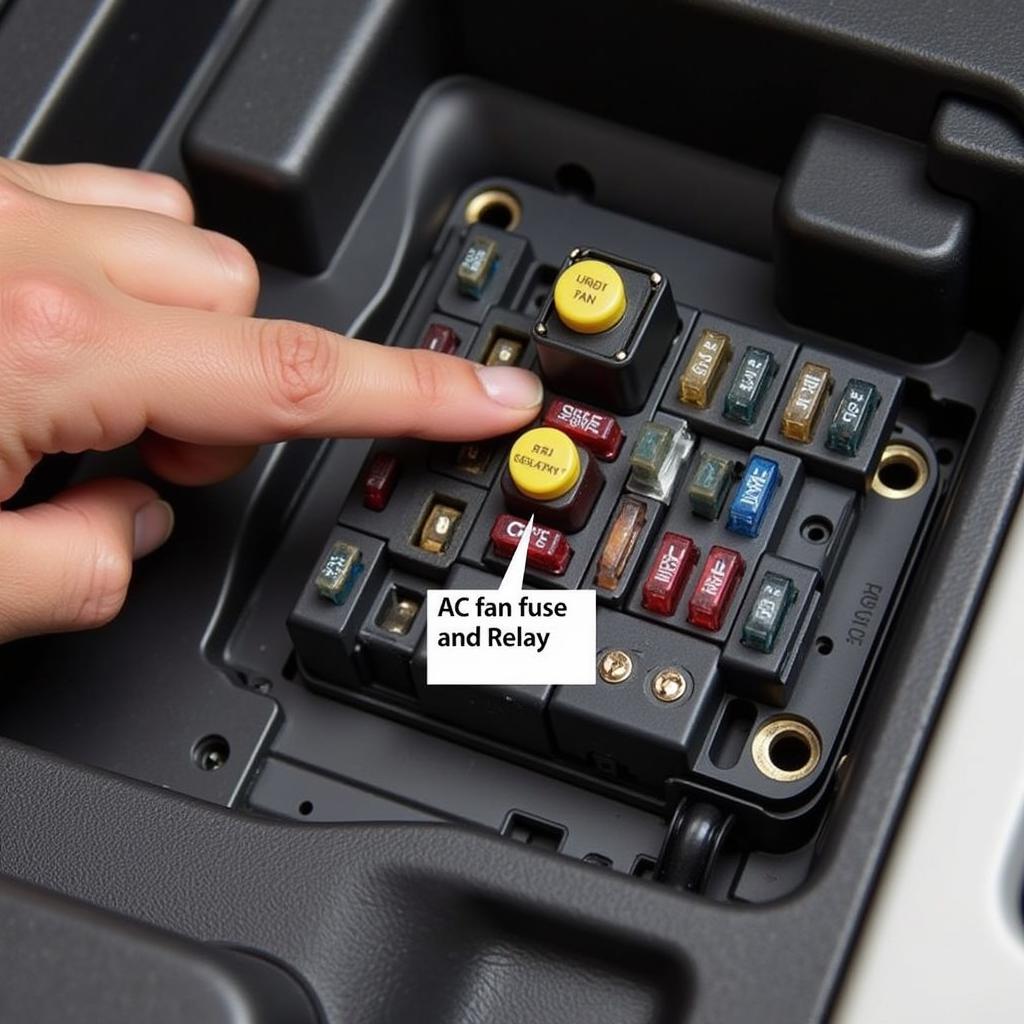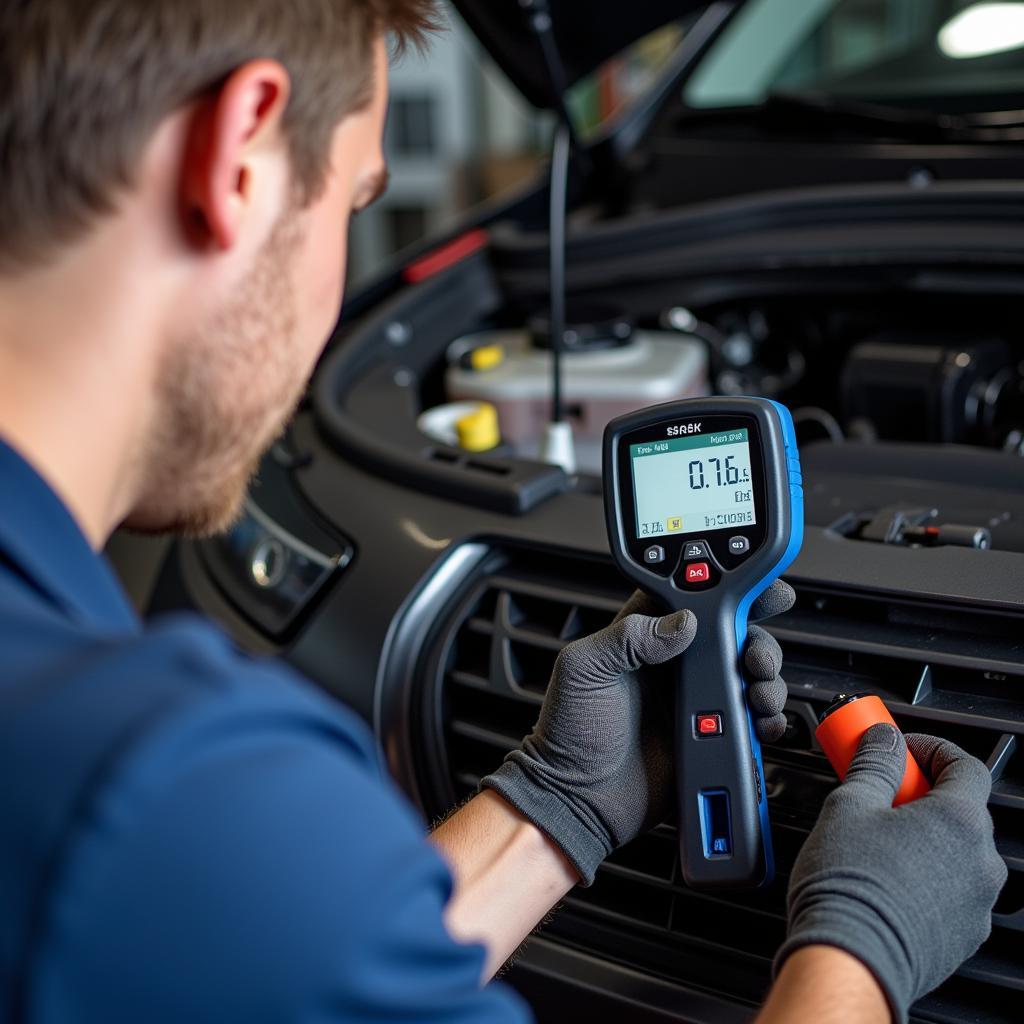A malfunctioning car air conditioning fan can make driving uncomfortable, especially during hot weather. Knowing How To Fix Car Air Conditioning Fan issues can save you money and time. This guide provides comprehensive steps and troubleshooting tips to help you diagnose and resolve common car AC fan problems. Let’s dive into understanding why your car’s AC fan might be acting up and explore various solutions, from simple checks to more involved repairs. For more information on AC repairs, check out where to get my air fixed in my car.
Understanding Your Car’s AC Fan System
Before we jump into fixes, it’s helpful to understand the basic components of your car’s AC fan system. The blower motor, resistor, relay, and control switch all play crucial roles. A problem with any of these components can affect the fan’s operation. Troubleshooting involves systematically checking each part to pinpoint the source of the issue.
Common Car AC Fan Problems and Solutions
Several issues can lead to a malfunctioning AC fan. These range from simple fixes like a blown fuse to more complex problems like a faulty blower motor. Let’s explore some common scenarios:
Fan Not Working at All
- Check the fuse: A blown fuse is a common culprit. Locate the AC fan fuse in your car’s fuse box and inspect it. If the metal filament inside is broken, replace it with a new fuse of the same amperage.
- Test the relay: The relay acts as a switch that controls power to the blower motor. Swap the AC fan relay with a similar relay in the fuse box. If the fan starts working, you’ve found the problem. Replace the faulty relay.
- Inspect the blower motor resistor: The resistor controls the fan speed. A faulty resistor can cause the fan to stop working altogether. Test the resistor with a multimeter to check for continuity. If there’s no continuity, replace the resistor.
 Checking the Car AC Fuse Box
Checking the Car AC Fuse Box
Fan Only Works on High Speed
- Faulty blower motor resistor: This is the most likely cause. The resistor is responsible for regulating the fan speed, and if it malfunctions, the fan may only work at its highest setting. Replace the resistor.
Fan Makes Noise
- Debris in the blower motor: Leaves, twigs, or other debris can get into the blower motor housing and cause noise. Remove the blower motor and clean out any debris.
- Worn blower motor bearings: Worn bearings can create a grinding or squealing sound. Replace the blower motor. For more detailed information, check out how to fix air conditioning in a car.
Weak Airflow
- Clogged cabin air filter: A dirty cabin air filter restricts airflow. Replace the cabin air filter.
- Blocked evaporator: A blocked evaporator can also reduce airflow. Have a professional inspect and clean the evaporator. You might need to find out the price to fix air conditioning in car for this service.
Intermittent Fan Operation
- Loose wiring: Check the wiring connections to the blower motor, resistor, relay, and control switch. Make sure all connections are secure.
- Faulty control switch: The control switch on the dashboard can malfunction, causing intermittent fan operation. Test the switch with a multimeter or replace it.
Professional Help
While many AC fan issues can be fixed with DIY methods, some problems require professional assistance. If you’re not comfortable working on your car’s electrical system or the problem persists after trying the troubleshooting steps above, it’s best to take your car to a qualified mechanic. If you’re wondering where can i have new car air conditioner fixed, there are many reputable shops available.
 Diagram of a Car’s AC System
Diagram of a Car’s AC System
“Regular maintenance is key to preventing AC problems,” says John Smith, ASE Certified Master Technician. “Checking and replacing your cabin air filter regularly can significantly improve airflow and prevent future issues.”
“Don’t underestimate the importance of a properly functioning AC system,” adds Jane Doe, Automotive Engineer. “It’s not just about comfort; it’s about safety, especially during extreme temperatures.”
Conclusion
Knowing how to fix car air conditioning fan issues can empower you to address minor problems yourself. By following the troubleshooting tips outlined in this guide, you can often identify and resolve the root cause of the problem. However, always remember that seeking professional help is essential for complex issues or if you’re unsure about working on your car’s electrical system. Don’t hesitate to contact us at AutoTipPro for assistance. Our phone number is +1 (641) 206-8880 and our office is located at 500 N St Mary’s St, San Antonio, TX 78205, United States. We are here to help with all your car AC needs!
 Mechanic Inspecting Car AC System
Mechanic Inspecting Car AC System
If you’re looking for solutions for when your AC is broken in car solutions until fixed, we have some tips for you.
FAQ
-
Why is my car AC fan not blowing cold air? This could be due to a low refrigerant level, a faulty compressor, or a blocked evaporator.
-
How often should I replace my cabin air filter? It’s generally recommended to replace the cabin air filter every 12,000 to 15,000 miles or annually.
-
What is the blower motor resistor? The blower motor resistor controls the fan speed.
-
How can I tell if my AC compressor is bad? Signs of a bad compressor include loud noises, weak airflow, and warm air blowing from the vents.
-
Is it safe to drive with a broken AC fan? While driving with a broken AC fan is possible, it can be uncomfortable, especially in hot weather. It can also affect visibility if the defroster is not working correctly.
-
How much does it cost to fix a car AC fan? The cost depends on the specific problem and the make and model of your car. Check for prices to fix AC in a car for estimates.
-
Can I recharge my car’s AC system myself? While DIY AC recharge kits are available, it’s generally recommended to have a professional recharge the system to ensure proper refrigerant levels and avoid damage to the system.






Leave a Reply